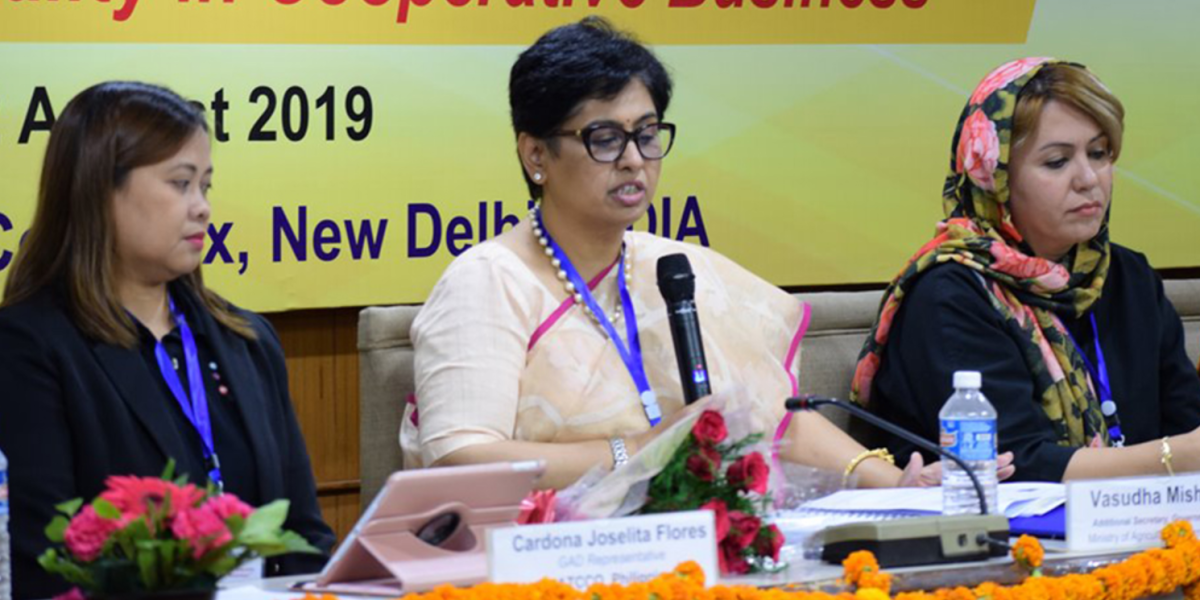Cardona urges Asian co-ops to kick-start Gender Equality
NEW DELHI – To address the inequalities that persist in many Asian countries, the International Cooperative Alliance Asia-Pacific conducted an International Workshop on “Enhancing Gender Equality in Cooperative Business” last August 20-22 2019.
NEW DELHI – To address the inequalities that persist in many Asian countries, the International Cooperative Alliance Asia-Pacific conducted an International Workshop on “Enhancing Gender Equality in Cooperative Business” last August 20-22 2019.
Hosting the event was the National Cooperative Union of India.
Co-op leaders participating were from Maldives, India, Malaysia, Bhutan, Japan, Iran, Nepal, Sri Lanka and the Philippines, represented by VICTO National and NATCCO Women’s Representative to the Board, Josie Cardona.
Cardona presented the current practices of the NATCCO and in Philippine society. And she wowed the participants. She highlighted that membership (and even leadership positions! ) in co-ops is open to women; male and female workers get the same pay for the same line of work, the NATCCO Board has one seat reserved for a Women’s representative, and that all Philippine co-ops are required to fill up the “Expanded Gender Tool” (EGT) that determines whether a co-op is mainstreaming or practicing Gender Mainstreaming.
Another surprise to the participants was the Philippine law on Maternity and Paternity leaves.
According to the Cooperative Development Authority (CDA) Memorandum Circular 2017-04, the EGT checks whether a co-op has written, approved and implements a gender policy; allocates budget for Gender & Development, has strategies to address GAD issues, and whether there are mechanisms established in the cooperative that ensures GAD mainstreaming is facilitated, implemented, and monitored.
“NATCCO was a prime example of equality during the workshop because there is a women’s representative in the Board,” Cardona said.
Cardona is also Manager of the Most Holy Rosary Multi-Purpose Cooperative in Rizal Province.
“Many of the participants at the workshop reported that even if they wanted to push gender equality, there are no laws that will support it. But I replied that they should start within their organizations, and eventually push for gender equality legislation,” she said.
“For starters, you can write it down in the bylaws of your co-op that there should be gender equality in the organization,” she added.
However, Cardona admits it will be a long-term goal. She cited the report of the delegation from India:
- Men have higher salaries for the same work done by women
- No program for development of women
- No loans to women because they have no work
- Women are supposed to be home by 8 pm
The objectives of the workshop are to:
- Take stock of the status and conditions of women in cooperatives
- Identify actions to promote gender equality and end discrimination in the work place
- Share best practices adopted by cooperatives to counter discrimination faced by women in cooperatives.
- Institutionalise collection, analysis and dissemination of gender-disaggregated data.
The workshop deliberated on strengthening policy (for example, affirmative action and better monitoring); redesign rules to target individuals (women) rather than households in membership and targeted implementation; mainstream gender in work policies (addressing safety and mobility); and targeted development programs.
The workshop dwelled into how apexes and cooperatives can use sex disaggregated data to plan, implement, monitor and evaluate in order to mainstream gender in co-operatives, thereby expanding member base and outreach.
According to the Prospectus of the workshop: “Inequalities persist between women and men in access to and control over resources and opportunities, both at home and at work. Despite significant gains made by women in the education sphere, in comparison to men, they have lower participation in the labor force, are more likely to remain employed, accept lower quality jobs and earn significantly less. At work, women face barriers in terms of leadership opportunities, advancement in rank, harassment on account of their gender, and discrimination in work conditions. Social norms place a bigger responsibility on women when it comes to household duties and childcare.”
The ICA-AP Committee on Women has been at the fore to mainstream gender and focused its efforts on countering patriarchal mindsets of those in leadership and management; training women and men in understanding and addressing workplace biases; tackling provisions in the bylaws of cooperatives to support greater participation of women; and on systematic collection, analysis and dissemination of gender-disaggregated data within their networks. The proposed workshop will take stock of the status of women in cooperatives and identify actions to promote gender equality and end discrimination in the workplace.
The International Co-operative Alliance [ICA] came to Asia Pacific Region with the establishment of the Regional Office & Education Center for South-East Asia in 1960 as a result of the discussions that had taken place at the various Congresses of the Alliance since 1948. At these discussions, ways and means were explored to bring the national Co-operative Movements in the developing countries closer to the Alliance and also to seize the global challenge of contributing through the instrument of Cooperation, to the social and economic development of the developing countries.
The 19th Congress of the ICA held in Paris in September 1954 passed a resolution emphasizing ‘the obligation which rests upon every member of the Alliance, and especially on those which are firmly established in their own countries, to supply every kind of aid and encouragement to co-operative pioneers and newly-formed organisations in the under-developed countries’ and directing the authorities of the Alliance to draw up a programme of action by the ICA and its members for the promotion of Co-operation in all its forms in the under-developed regions of the world and to consider ways and means to providing the finance necessary for the execution of this programme.

